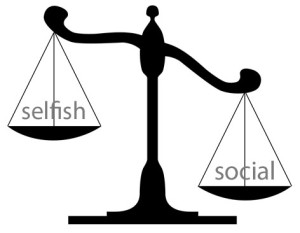 When you read that (book) title, what do you think it refers to? If you’re like most people, you think it is saying, “me ahead of you – me, my needs, wants and desires come before yours!” But the author explained that what she actually meant to convey with the title was: “me, what I was like, before I met you, i.e. the impact you had on me”. Huh! Well, now that you put it that way…
When you read that (book) title, what do you think it refers to? If you’re like most people, you think it is saying, “me ahead of you – me, my needs, wants and desires come before yours!” But the author explained that what she actually meant to convey with the title was: “me, what I was like, before I met you, i.e. the impact you had on me”. Huh! Well, now that you put it that way…
So communication can be problematic, especially when you think you’re saying one thing and the other person is thinking something entirely different… Here’s another example of unclear, therefore confusing communication: others are critical – are others being critical in their opinions…?…or… are other people very important…? Hmmm, hard to know, and very different!
But back to Me Before You, which nicely highlights the selfish/social dichotomy we all try to keep balanced almost every hour of every day. It’s a real balancing act to keep the two in check:
Charity begins at home – selfish!
Lend a helping hand – social!
Blood is thicker than water – selfish!
Share and share alike – social!
Where’s my share? No fair! – selfish
Everyone gets a turn – social
Tell me a story/Let me tell you about it – selfish
Let’s not start until everyone arrives – social
We can’t help it – we’re selfish! It’s necessary to getting ahead, the competitive urge, survival of the fittest, only the strong survive and all that. It’s our “job” to advance the gene pool, carry forth the species, preferably in our own image.
But we also must be very social, cooperate, no man is an island, can’t do it alone. It’s tough out there and we need all the help we can get. Just try to be fully independent and see how long you last living off the land, sewing all your own clothes, growing all your own food, generating your own power – plus it’s just no fun being voted off the island.
Balancing the two natural drives is the trick. Going too far in one direction makes you either an anti-social loner that no one likes, or a doormat that everyone takes advantage of.
Here’s a test: Your friend Jane says, “I just saw (name of a joint acquaintance) who I haven’t seen in years and s/he looks great, s/he’s aging really well!” Now, is your first thought –
A. I wonder if Jane thinks I’m aging well?
B. Oh, I haven’t seen him/her in years…
The point is that many take the WIIFM (what’s in it for me) route A and you need to expect that. Every time, every communication. The other person is likely reframing whatever you said to their own selfish thought of: how does this apply to me and my situation?
Realizing this happens on a regular basis and preparing for it in advance of opening your mouth is a smart way to communicate. Your communication will be clearer because you will understand and be thinking like the other person. Getting out of your head (selfish) and into the other person’s head (social) is the best approach to effective and persuasive communication. And we’re all trying to persuade (selfish) someone (social) of something pretty much most of the time, aren’t we?
What’s your leaning?
